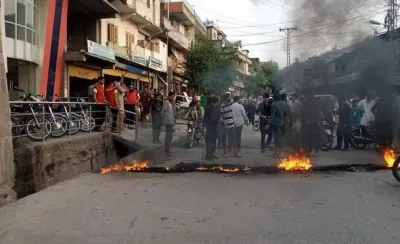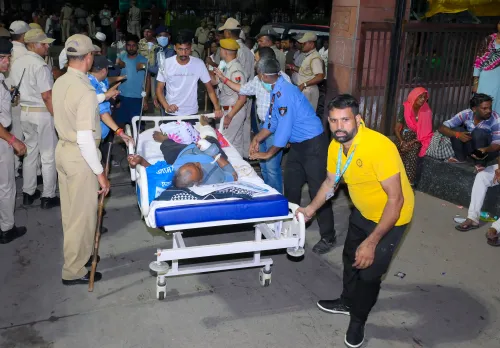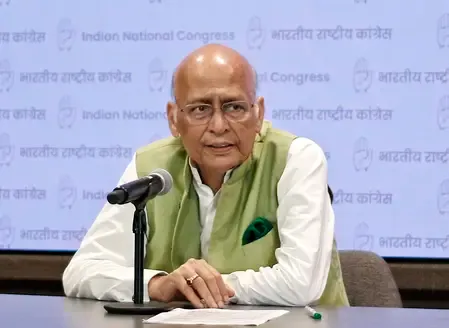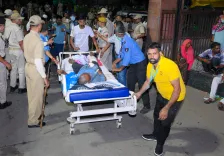Is Islamabad Truly Dominant While Claiming Freedom?

Synopsis
Key Takeaways
- The claim of autonomy in POJK is undermined by Islamabad's control.
- Protests highlight the demand for local governance and resource allocation.
- Political representation often favors Islamabad's interests over local needs.
- Major projects like the Mangla Dam provide limited benefits to locals.
- Public discontent is rising as the gap between promises and reality widens.
New Delhi, Oct 5 (NationPress) The recent turmoil in Pakistan-Occupied Jammu and Kashmir (POJK) and the role of Islamabad in addressing it has once again exposed its facade of declaring a region as "free" while it remains under strict occupation.
Intensive security measures, communication blackouts, and the dispatch of emissaries for on-ground negotiations all underline Islamabad's total control over this territory.
Despite being labeled as a self-governing entity that purportedly adheres to its own Constitution, complete with a Legislature, President, Prime Minister, courts, and Ministries, the core sovereign powers lie primarily with Pakistan's federal government and its security apparatus.
These realities are corroborated by information available through open sources.
The POJK Legislative Assembly consists of 53 members, including 45 directly elected representatives and 8 reserved seats—5 for women, 1 for a technocrat, 1 for an ulema, and 1 for overseas nationals.
Notably, among the 45 general seats, 12 are designated only for "refugees from Jammu & Kashmir".
Last week, widespread protests erupted across POJK, spearheaded by the Jammu Kashmir Joint Awami Action Committee (JAAC), which put forward a 38-point demand, calling for the abolition of these seats that essentially represent Islamabad's nominees.
Other demands included subsidies aimed at easing the burden of basic necessities like power and flour, whose prices have been soaring.
Additionally, they requested an end to privileges for the elite and increased local control over their resources.
It is significant to note that while Islamabad allocates funds and subsidies, it retains authority over their distribution.
Major developmental projects in POJK, such as hydropower initiatives like the Mangla Dam, remain under Pakistan's control, providing minimal benefits to local residents.
The Mangla Dam, located on the Jhelum River, is among the largest in Pakistan, playing a crucial role in irrigation and hydroelectric power generation.
Furthermore, protesters emphasized that voters in 12 of the 45 constituencies are Kashmiri "refugees" registered in various districts outside of POJK.
These individuals are from Pakistan, scattered across regions like Punjab, Sindh, Khyber Pakhtunkhwa, and Balochistan, yet they are not recognized as POJK residents.
Consequently, the so-called refugee-seat members in the POJK Legislative Assembly in Muzaffarabad actually represent individuals based in Pakistan rather than those living in the territory itself.
The political parties in the area are primarily extensions of national political parties in Pakistan, including Pakistan Tehreek-e-Insaaf (PTI), Pakistan Muslim League-Nawaz (PML-N), and Pakistan Peoples Party (PPP), among others.
Moreover, senior administrative positions, including the chief secretary and other high-ranking officials, are filled by individuals from Pakistan's federal and provincial services or with Islamabad's consent, further linking local administration to federal oversight.
The Ministry of Kashmir Affairs and Gilgit-Baltistan functions as a formal link between Islamabad and POJK, having the power to intervene in policies and negotiations.
In previous instances, Islamabad has demonstrated its authority, intervening in leadership changes, including the removal of POJK Prime Ministers.
Thus, it was not unexpected that negotiations were led by a delegation sent by Pakistan's Prime Minister Shehbaz Sharif rather than representatives of a locally elected government.
Even the reported agreement reached between the Islamabad team and the protesters was publicly announced by Pakistan's Parliamentary Affairs Minister Tariq Fazal Chaudhry.
A mere modification to the name of an illegally occupied region does not equate to freedom.
Pakistan retains overwhelming influence over nearly all facets of the region, leaving its inhabitants vulnerable to Islamabad while maintaining a deceptive facade.









